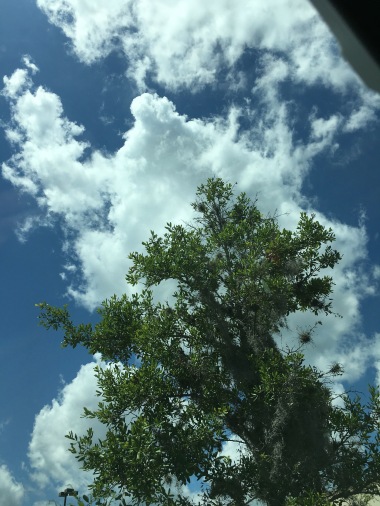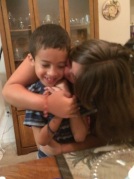 While working with some people with mental illness, I have learned a lot about how effective mindfulness can be in helping with some symptoms of mental illness. I counsel individuals with a diagnosed mental illness. Some of these people can suffer significantly from their symptoms. For example, today I visited a lady who lives by herself and 12 cats. She suffers from Schizophrenia, the paranoid type. She is also hard of hearing. When she opened the door, she complained that she could not sleep because the “voices” were too loud. Can you imagine not hearing anything, except voices that scream at you and don’t let you sleep at night? I usually prompt her to distract herself by engaging in an activity that she enjoys, such as painting or watching TV. Any activity that she enjoys and helps to be focused on the present moment.
While working with some people with mental illness, I have learned a lot about how effective mindfulness can be in helping with some symptoms of mental illness. I counsel individuals with a diagnosed mental illness. Some of these people can suffer significantly from their symptoms. For example, today I visited a lady who lives by herself and 12 cats. She suffers from Schizophrenia, the paranoid type. She is also hard of hearing. When she opened the door, she complained that she could not sleep because the “voices” were too loud. Can you imagine not hearing anything, except voices that scream at you and don’t let you sleep at night? I usually prompt her to distract herself by engaging in an activity that she enjoys, such as painting or watching TV. Any activity that she enjoys and helps to be focused on the present moment.
I often encourage people to focus on the present moment in order to distract themselves from the thoughts that are triggering the anxiety, anger, or sadness. But recently I have tried to encourage clients to change their perspective by changing their physical position.
When we displace ourselves and have a different perspective, we are suddenly doing some mindfulness. For example, if we usually sit on the same side of a table out of habit, but suddenly decide to change to another side, the perspective will change. And when the perspective changes, our attention are automatically shifted to the surroundings. We will then start studying, observing, and adjusting to the new perspective. We start being mindful.
While talking to another client in counseling, I suggested to her to change to the other side of her sofa. She was hesitant to do so because her usual side of the sofa makes her feel safe and secured . But this “security” is only temporary and superficial. It simply gives her a false sense of “power” and “control.” But the idea of maintaining power and control does not lead us to inner peace. It only triggers more anxiety and insecurity. So letting go of the urge to be “in a safe place” is always short lived. It is like being hungry for chocolate, so we go back to eating the chocolate candy that we crave for and we are then satisfied. But the satisfaction only last a certain amount of time and it eventually goes away, and we feel the urge to eat chocolate again. By surrendering our urge to feel secured, we finally can start living inner peace. We start experiencing true freedom.
Yet another client has been struggling with grieving the death of her friend, but she tends to think about ending her own life in order to “join” her friend. I reminded her that it is normal to be sad and to miss the deceased person. It is healthy to set up time aside to cry and to be withdrawn. But it is also healthy to return to the routine of every day life. And this can be accomplished by changing and engaging in new activities. Every time we start something new, either a volunteer work, a new hobby, or a new chore, we are forcing ourselves to pay attention to the present moment. We are inclined to observe and study what is NEW. And it keeps the thoughts that were making us feel angry, anxious, or sad away from our minds.
So next time you feel anxious about whatever is causing the anxiety, one way to shift the focus is to move to a different spot. Once you change spots, simply observe. Look around you. Contemplate on the details of your surroundings . Also try to engage in a new activity. Study it. Learn from it.
And enjoy the present moment. Fully.






 While working with some people with mental illness, I have learned a lot about how effective mindfulness can be in helping with some symptoms of mental illness. I counsel individuals with a diagnosed mental illness. Some of these people can suffer significantly from their symptoms. For example, today I visited a lady who lives by herself and 12 cats. She suffers from Schizophrenia, the paranoid type. She is also hard of hearing. When she opened the door, she complained that she could not sleep because the “voices” were too loud. Can you imagine not hearing anything, except voices that scream at you and don’t let you sleep at night? I usually prompt her to distract herself by engaging in an activity that she enjoys, such as painting or watching TV. Any activity that she enjoys and helps to be focused on the present moment.
While working with some people with mental illness, I have learned a lot about how effective mindfulness can be in helping with some symptoms of mental illness. I counsel individuals with a diagnosed mental illness. Some of these people can suffer significantly from their symptoms. For example, today I visited a lady who lives by herself and 12 cats. She suffers from Schizophrenia, the paranoid type. She is also hard of hearing. When she opened the door, she complained that she could not sleep because the “voices” were too loud. Can you imagine not hearing anything, except voices that scream at you and don’t let you sleep at night? I usually prompt her to distract herself by engaging in an activity that she enjoys, such as painting or watching TV. Any activity that she enjoys and helps to be focused on the present moment.
 We cannot experience the present moment if we are constantly thinking about other things, ideas … The only thing we can know for sure… what we can be certain of is what we are experiencing right now.
We cannot experience the present moment if we are constantly thinking about other things, ideas … The only thing we can know for sure… what we can be certain of is what we are experiencing right now.
 Have you noticed that, when you visit a particular setting for the first time, either a new town, a new house, or a new park, that the first impression is always different than the impression you have on the same place a few minutes later?
Have you noticed that, when you visit a particular setting for the first time, either a new town, a new house, or a new park, that the first impression is always different than the impression you have on the same place a few minutes later? want or wish something, we are setting ourselves up to suffering.
want or wish something, we are setting ourselves up to suffering.